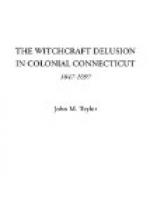“Selden took up a somewhat peculiar and characteristic position. He maintained that the law condemning women to death for witchcraft was perfectly just, but that it was quite unnecessary to ascertain whether witchcraft was a possibility. A woman might not be able to destroy the life of her neighbor by her incantations; but if she intended to do so, it was right that she should be hung.” Rationalism in Europe (Vol. 1, p. 123) LECKY.
The fundamental authority for legislation, for the decrees of courts and councils as to witchcraft, from the days of the Witch of Endor to those of Mercy Disborough of Fairfield, and Giles Corey of Salem Farms, was the code of the Hebrews and its recognition in the Gospel dispensations. Thereon rest most of the historic precedents, legislative, ecclesiastical, and judicial.
“Thou shalt not suffer a witch to live.” Exodus xxii, 18.
What law embalmed in ancientry and honored as of divine origin has been more fruitful of sacrifice and suffering? Through the Scriptures, gathering potency as it goes, runs the same grim decree, with widening definitions.
“And the soul that turneth after such as have familiar spirits and after wizards ... I will even set my face against that soul and will cut him off from among his people.” Deuteronomy xviii, 10-11.
“There shall not be found among you any one that maketh his son or his daughter to pass through the fire, or that useth divination, or an observer of times, or an enchanter, or a consulter with familiar spirits, or a wizard, or a necromancer.” Deuteronomy xviii, 10-11.
“Saul had put away those that had familiar spirits, and the wizards out of the land.” Samuel i, 3.
“Now Saul the king of the Hebrews, had cast out of the country the fortune tellers, and the necromancers, and all such as exercised the like arts, excepting the prophets.... Yet did he bid his servants to inquire out for him some woman that was a necromancer, and called up the souls of the dead, that so he might know whether his affairs would succeed to his mind; for this sort of necromantic women that bring up the souls of the dead, do by them foretell future events.” Josephus, Book 6, ch. 14.
“For rebellion is as the sin of witchcraft.” Samuel i, 15-23.
“And I will cut off witchcraft out of the land.” Micah v. 12.
“Many of them also which used curious arts brought their books together and burned them.” Acts xix, 19.
“But there was a certain man called Simon which beforetime in the same city used sorcery and bewitched the people of Samaria.” Acts viii, 9.
“If a man abide not in me, he is cast forth as a branch, and is withered, and men gather them and cast them into the fire, and they are burned."[C] John xv, 6.
[Footnote C: In the opinion of the eminent Italian jurist Bartolo, witches were burned alive in early times on this authority.]




